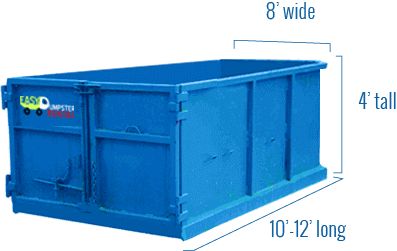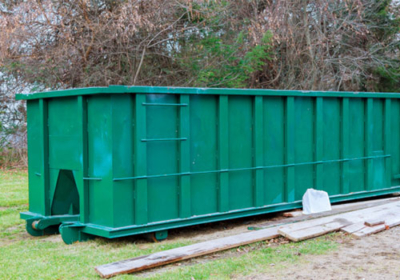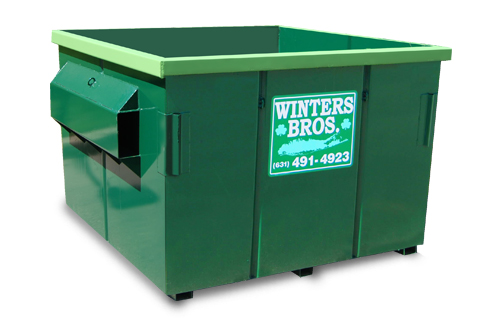Renting a dumpster can be a daunting task, but by following these top 10 ideas and tricks, you can ensure a seamless and effective procedure. Beginning by choosing the right dumpster size and type for your job, and properly compute your debris volume to stay clear of overages or inconvenient mid-project swaps. Understand weight restrictions, understand pickup and distribution charges, and prepare the drop-off area to reduce risks. Load the dumpster successfully, stay clear of prohibited waste items, and review contracts carefully to understand included solutions and renter obligations. By adhering to these vital pointers, you'll be well on your method to a hassle-free dumpster rental experience - and there's even more to discover.
Know Your Dumpster Size Options
When undertaking a task that includes considerable waste disposal, picking the right dumpster size is important to guaranteeing efficient and cost-effective waste management.
A dumpster that is also small can bring about boosted costs and hassle, while one that is also huge can result in thrown away area and resources. Luckily, dumpster rental companies use a variety of sizes to suit different task needs.
Typical dumpster dimensions vary from 10 to 40 cubic lawns, with one of the most usual sizes being 20 and 30 cubic backyards. The 10-yard dumpster is perfect for small projects, such as washroom remodels or minor remodellings, while the 40-yard dumpster is better matched for large building and construction projects or commercial cleanups.
Consider the kind and quantity of waste you expect to generate, along with the available area on your site, when choosing a dumpster dimension. By choosing the best size dumpster, you can guarantee a smooth and effective waste monitoring process that fulfills your project's one-of-a-kind needs.
Plan Ahead for Delivery
Frequently, project timelines are hindered by logistical oversights, and dumpster delivery is no exemption. To stay clear of unneeded hold-ups, it's crucial to intend ahead for your dumpster arrival. Confirm the delivery date and time with your rental provider to guarantee you're prepared to receive the dumpster.
Clear the shipment location of any type of obstructions, such as parked lorries or looming branches, to supply simple gain access to for the delivery van. If you're renting out a dumpster for a household project, notify your neighbors of the upcoming delivery to lessen any type of potential disruptions.
Additionally, assign a specific place for the dumpster, taking into account any kind of local regulations or home owners' association rules. Verify the dumpster dimension and kind with your rental service provider to make certain it fits in the designated area.
Calculate Your Particles Volume
Accurately approximating the volume of particles your job will certainly produce is necessary to selecting the appropriate dumpster dimension and preventing costly excess or inconvenient mid-project swaps.
To calculate your debris volume, think about the following elements:
Weight and density: Various materials have differing weights and thickness, influencing the general quantity of particles. As an example, hefty products like concrete or asphalt use up less space than lighter materials like drywall or roofing shingles.

Debris kind and size: Damage down debris into groups, such as building and construction materials, backyard waste, or household things. Price quote the volume of each category based upon the dimension and amount of items.
Container constraints: Take into consideration the dumpster's measurements, including length, width, and height. Assurance you have adequate area for the approximated particles quantity, leaving some space for easy loading and unloading.
Project scope and timeline: Change your quote based on the job's scope and timeline. Larger jobs or those with several phases may call for more debris removal capacity.
Choose the Right Dumpster Type
Selecting the ideal dumpster type is an essential step in guaranteeing a smooth waste monitoring process, as it straight affects the performance and cost-effectiveness of your project. With various dumpster types available, it's important to pick the one that best fits your specific needs.
Roll-off dumpsters, for instance, are ideal for large-scale projects, such as building and construction or demolition, where a considerable amount of waste requires to be taken care of. These dumpsters come in various sizes, ranging from 10 to 40 backyards, and are furnished with wheels, making them simple to steer around the site.
On the various other hand, compactors are perfect for smaller projects, like residential remodellings or small business waste monitoring. They are created to press waste, reducing the number of journeys needed for disposal.
Additionally, some dumpster rental firms supply specialized dumpsters for certain products, such as concrete, asphalt, or lawn waste. By picking the appropriate dumpster type, you can guarantee a more efficient and cost-effective waste management process.

Be Familiar with Weight Limits
When selecting the ideal dumpster type, it's similarly vital to be conscious of the weight limitations associated with each dumpster size. Overwhelming a dumpster can cause additional costs, security threats, and even damages to the dumpster itself. To prevent these issues, it's necessary to comprehend the weight restrictions of your selected dumpster.
Here are some essential considerations to remember:
Know the weight limit: Confirm the weight restriction of your dumpster leasing with your service provider to guarantee you remain within the allowed range.
Estimate debris weight: Precisely estimate the weight of the particles you prepare to dispose of to select the appropriate dumpster size.
Avoid overloading: Don't overload the dumpster, as this can result in extra fees, safety and security risks, and damage to the dumpster.
Ask regarding weight-based pricing: Some dumpster rental providers bill based upon the weight of the particles, so make certain to ask about their rates structure.
Understand Pickup and Shipment Fees
Additional costs can prowl in the fine print of your dumpster rental agreement, and one typically ignored facet is the fees associated with pickup and delivery
These fees can add up quickly, so it's important to understand what you're spending for. Normally, dumpster rental business charge different fees for distribution, pick-up, and in some cases also sustain surcharges. Make certain to ask about these charges upfront to prevent surprise charges on your last bill.
Some companies might supply a flat rate for distribution and pickup, while others may charge by the mile or by the ton. Recognizing the specifics of your agreement will certainly assist you prepare your budget plan accordingly.
It's likewise important to clarify what is included in the delivery and pick-up fees, such as whether the chauffeur will certainly help with placement or elimination of the dumpster. By recognizing these costs, you can avoid unexpected costs and guarantee a smooth rental experience.
Prepare the Drop-Off Location
To assurance a seamless dumpster rental experience, it's vital to prepare the drop-off place prior to the dumpster gets here. A well-prepared site guarantees the dumpster can be positioned securely and effectively, decreasing the risk of damages or delays.
Before the dumpster shows up, ensure to:
Clear the area: Get rid of any kind of obstacles, consisting of vehicles, furniture, or particles, to offer a clear path for the dumpster.
Mark the location: Plainly mark the drop-off area with cones or tape to guide the delivery driver.
Check for above clearance: Verify there are no low-hanging branches, cords, or various other blockages that might interfere with the dumpster's placement.
Designate a contact person: Identify an individual to be existing throughout distribution and pick-up to attend to any questions or concerns.
Load the Dumpster Efficiently
Properly packing the dumpster is essential to maximize its capacity, reduce the danger of damages, and assure a smooth rental experience. To achieve this, it's essential to intend in advance and arrange your waste disposal strategy.
Start by positioning the heaviest items, such as building and construction materials or home appliances, at the end of the dumpster. This will offer a stable base and stop lighter products from getting crushed.
Next, fill in the spaces with smaller things like boxes, furnishings, and loose particles. Make certain to distribute the weight evenly and prevent overwhelming one side of the dumpster.
Leave some area on top for easy loading and discharging, and consider utilizing tarps or ropes to secure loosened items during transportation.
Avoid Prohibited Waste Items
Some usual prohibited things include:
Hazardous materials: batteries, electronics, chemicals, and fluorescent light bulbs

Toxic substances: asbestos, pesticides, and contaminated materials
Flammable liquids: gasoline, oil, and paint thinner
Large appliances: fridges, air conditioning system, and freezers
Failure to abide by these regulations can lead to serious effects, including environmental injury and lawful issues.
Always contact your dumpster rental supplier for certain guidelines on banned waste items to ensure a http://piedmont-triad-dumpsters.almoheet-travel.com/just-how-to-safely-dispose-of-hazardous-products-with-a-rented-dumpster smooth and effective garbage disposal experience.
Review and Understand Contracts
It's likewise essential to examine the scope of work, including what services are consisted of and what duties fall on you as the renter.
Understand the process for resolving disputes and the treatment for terminating the agreement if needed.
Don't think twice to ask inquiries or demand explanation on any type of uncertain provisions.
By taking the time to assess and comprehend the agreement, you can assure a smooth and hassle-free dumpster rental experience.